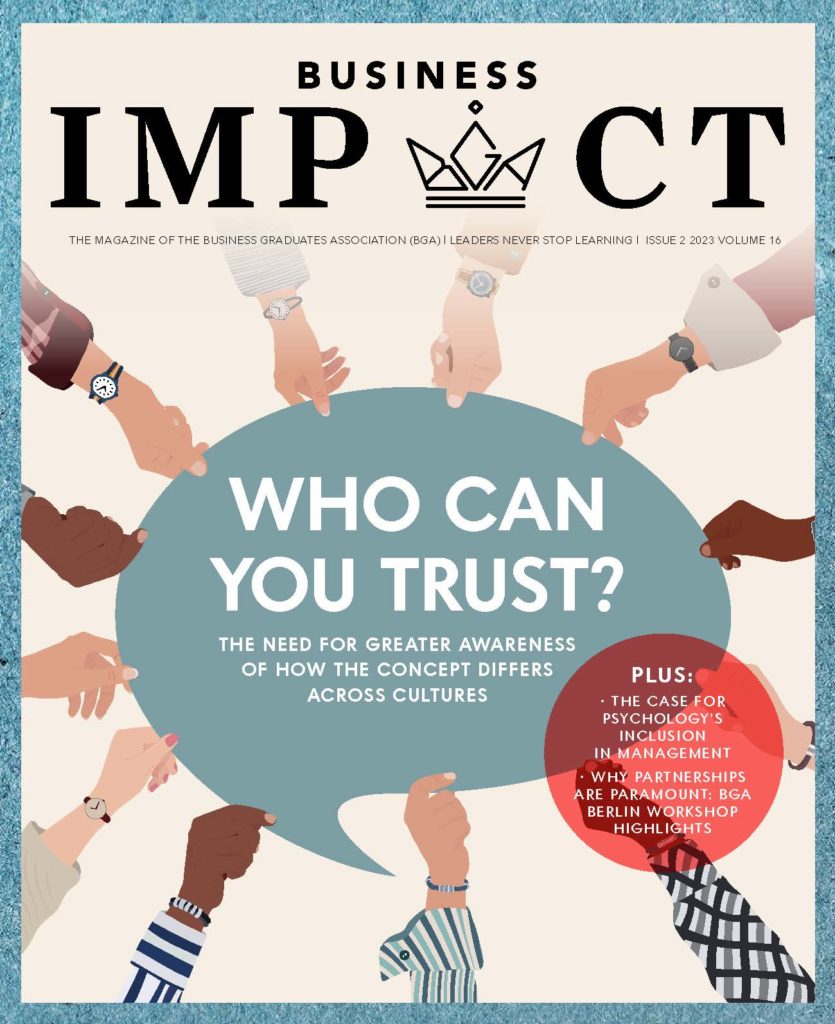In 1986, when Ronald Reagan was preparing for nuclear treaty negotiations with then-Russian president Mikhail Gorbachev, his adviser suggested that Reagan ought to learn a few Russian proverbs. According to The Washington Post, the phrase he liked best was “trust, but verify”, something that he was fond of repeating in further meetings with Gorbachev.
The phrase entered the political lexicon to such an extent that Barack Obama also used it to explain his stance when facing Vladimir Putin in 2009. It continues to be in use to this day; then‑US secretary of state Mike Pompeo adapted it to “distrust and verify” when dealing with the Chinese Communist Party.
As managers, we make judgements about trust and the trustworthiness of others all the time. Trust judgements come in a variety of different forms. For example, we place our trust in legal agreements, in the members of our team and the people we meet. In the workplace, we place our trust in the interpersonal relationships that we develop with other people in our organisation. Sometimes this trust is earned by the behaviours of others, while sometimes we take a risk and follow our gut instincts about a person. Whether we trust someone also depends very much on the context, since our attitudes towards another person may differ according to where we meet them, be that in the office or in a darkened alley.
We may assume that trust is linear, being either trust or distrust, but some have argued that the construct is more complex. For example, trust judgements may be influenced by the culture to which we belong. According to Helen Altman Klein, emeritus professor of psychology at Wright State University, the way we assess the trustworthiness of others is affected by our cultural background. These complexities must be addressed both cautiously and responsibly.
In our professional lives, we may be misled by a narrow perspective on trustworthiness, expecting people from other cultures to have the same trust concept. For example, my personal expectations about trustworthiness were developed in the UK and I recognise that my students, being multicultural, will have different perspectives. But what do we mean by ‘trust,’ and why should trust be of interest to graduates, managers and business school practitioners?
Workplace benefits
The benefits of trust in the workplace are well documented and trust has been described as the social glue that holds relationships together. Trusting relationships at work lead to the tendency to help others, enhanced job satisfaction and personal motivation, greater commitment and productivity, argues Namporn Thanetsunthorn in a paper entitled The impact of national culture on corporate social responsibility. This workplace trust then relates to the success and competitiveness of an organisation; see The influence of trust on the trilogy of knowledge creation, sharing and transfer, compiled by Dolores Sanchez Bengoa and Hans Ruediger Kaufmann.
Moreover, trust fosters co-operation and teamwork, reduces unnecessary bureaucratic control and administrative costs. Trust is essential for efficient communication and sharing of knowledge. It is through trusting relationships that we improve our creativity at work. In this way, an organisation with high trust between its employees develops a competitive advantage, leading to enhanced organisational performance, say Roy J Lewicki, Daniel J McAllister and Robert J Bies in Trust and distrust: new relationships and realities.
However, the many benefits of trusting relationships at work do not mean we should drop our guard completely and decide to trust others without first auditing the personal and professional risks of doing so. When we trust other people, we take a gamble. We need trusting relationships to function in our daily lives and, to some extent, our social order and social capital depends on trusting others. This does not imply that we should put ourselves at risk since, when our trust is misplaced or abused, the costs can be very high. That said, we decide to take risks daily when we trust others and perhaps it would be more prudent to always perform some sort of risk assessment.
When we trust another person, we are willing to become vulnerable because of that decision (Roderick M Kramer, Trust and distrust in organizations). For this reason, we must always be careful with our assessments of trustworthiness. This argument could be summarised thus: “Only decide to trust others with your eyes open.” A pragmatic approach might be to always verify that we place our trust in the right people.
Complexities of the concept
Twitter’s ‘blue tick’ system, for example, has been an attempt to implement a verification process that can counter bots and trolls. Twitter initially began verifying accounts in 2009 to differentiate between real people and fake accounts, since famous people including the likes of Donald Trump were being impersonated – the reason Trump himself uses the handle @realDonaldTrump. Without such a verification process, it is argued, we cannot be certain that Twitter accounts are genuine.
In the real world, we also usually conduct some form of verification process before deciding to trust someone. Trust is complex and we must not be naïve about our reasons. A person may be perceived to be trustworthy, but it takes a further cognitive ‘leap’ to decide to trust them. When we take a leap, we also take a risk. A ‘leap of faith’ is a decision based on emotional and irrational foundations.
This leap of faith is taken when we want to believe that another person is telling the truth, even when the evidence shows otherwise (see Trust as a social reality by J David Lewis and Andrew Weigert). When we allow ourselves to become vulnerable to another person based on little more than a gut feeling, this can have quite serious impacts on us both personally and professionally.
The emotional side of the trust equation must not be ignored, however, and decisions about trustworthiness can be based on relationships, such as those within families. We generally experience stronger and more enduring trust in families than at work, since workplace relationships are considered more unstable and short term than family relationships.
According to Catherine T Kwantes, co-editor of Trust and trustworthiness across cultures, when we are willing to trust another person, we go through an assessment process whereby we allow ourselves to be vulnerable to them, based on our expectations about how that person will behave when we have trusted them. We have decided to spend less time and energy protecting ourselves from being exploited, thereby opening ourselves up to risk. We have estimated the risks posed by another person, resulting in some measure of uncertainty.
Since we are motivated to protect ourselves, we will develop an impetus to reduce that uncertainty. In her book, Why workers still identify with organizations, Denise M Rousseau contends that this is especially true when we are at work and our job may depend on verifying the trust that we have placed in another person. Some may seek conditions to prevent being cheated or sabotaged, but to some extent we always accept some degree of personal risk.
Applying specific criteria
When we consider trusting someone at work, we should apply explicit criteria, claim Roger C Mayer, James H Davis and F David Schoorman, co-authors of An integrative model of organizational trust. These cover: ability – the perceived competence of another person; benevolence – the belief that they have your best interests in mind; and integrity – the perception that they adhere to acceptable values or principles.
As educators, we should approach the trust concept with sensitivity and care. I advise this cautious approach since concepts of trust may differ between cultures, meaning that we should not assume that any single view of what trust means is superior. This approach is even more important when teaching overseas, where we may find ourselves with a minority viewpoint.
In my classes, I like to ask questions that explore the assumptions my students have about trust. I like to invite them to talk openly about their perspectives on trust and to talk about the challenges they have faced when trusting others in another culture. This sometimes reveals interesting differences between their understandings of what it means to trust. For instance, in some cultures the trust concept relates more closely to an ongoing relationship with the person who is considered trustworthy, rather than an assessment of their ability, benevolence or integrity.
I consider asking open questions to be an important part of the practice of teaching. I also like to adopt a somewhat naïve approach, by inviting my students to explain concepts such as trust to me so that we can dissect the variety of interpretations and explore any uncertainties and challenges relating to those definitions. In this way, I explore the cultural assumptions and perspectives that exist about trust, starting by assuming that the trust concept is complex with a range of meanings. I prefer to follow this approach to avoid prescribing my own personal view.
The international arena
Business school students are a diverse group of people and, on graduation, may work in culturally diverse contexts. It is important, therefore, to use class time to explore how the trust construct is influenced by differing cultural contexts.
Due to globalisation, businesses today have become more multinational than ever before. The trend towards increasing globalisation means that we need to recognise the growing importance of understanding how a diverse workforce works together. In Influence of trust and participation in decision making on employee attitudes in Indian public sector undertakings, S Pavan Kumar and Shilpi Saha argue that trust is essential for cross-cultural strategic collaborations, relationships and partnerships, but this does not mean that we should ‘trust all’ without considering the cultural angle.
Although there will be some generalisations about trust, expectations about trustworthiness can depend on both culture and the context, according to Altman Klein. It should also not be assumed that in every situation we should seek first to trust, while ignoring the political and economic contexts. As professionals, we should not be naïve when making trust judgements and should consider the risks of doing so. Moreover, culture and trust are linked to the extent that what is considered trustworthy may depend on our personal cultural perspective about what is deemed trustworthy. We tend to both reinforce relationships that are consistent with our personal cultural values and beliefs and punish those values and beliefs that we judge to be inconsistent with our own, says Kwantes.
Dutch social psychologist Geert Hofstede famously coined the term ‘power distance’ to describe cultures in which powerful people are expected to assume authority, make decisions and take responsibility. In power distance cultures, people with less power will expect those in power to act in an assertive manner. Similarly, in such societies those with less power tend to disagree less with those in a position of authority. This power difference has an impact on whether individuals trust each other, to the extent that individuals in these cultures generally place less trust in others. In this scenario, it would not be wise to put oneself at risk by placing trust in a high-powered individual, since they may view you as a threat.
One further cultural phenomenon that influences interpersonal relationships at work is called ‘guanxi,’ defined by Kwang‑kuo Hwang in Face and favor: the Chinese power game as the connections between individuals, reciprocity and the need to exchange favours. This exchange results in a kind of social glue that holds societal functions and interpersonal relationships together. Guanxi impacts on the formation, development and maintenance of trust in Confucian-influenced countries such as China and Japan.
With guanxi, trustworthiness is assigned to an individual who can keep their word; as Izak Benbasat and Weiquan Wang outline in Trust in and adoption of online recommendation agents, this perspective on the trustworthiness of others leads to a dislike for the use of legal contracts in business dealings. Instead of legal contracts, these cultures prefer to establish trust at a personal level, according to An empirical study of overseas Chinese managerial ideology, compiled by SG Redding and Michael Hsiao.
Chinese workers may prefer to rely on the relationship, thereby skirting the need to appraise trust in their colleagues. The Chinese might also describe trust in more affective terms, associating trust more closely with the relationship developed with another person and how they view their obligations to each other, as per The problem of trust by Adam B Seligman. In Chinese organisations, members of a tight knit ‘in-group’ may be close friends who consider members of an ‘out-group’ to be competitors for limited resources. In-group members, therefore, depend preferentially on other members of the same group.
Sensitive by nature
When teaching, it is important to be aware of both cultural and political differences, since the trust construct impacts business, international politics, economics and trade. Canada, for example, recently banned two of China’s biggest telecom equipment makers, Huawei and ZTE, apparently to “protect the safety and security of Canadians” and to safeguard its telecommunications infrastructure. This means that telecoms firms in Canada will no longer be able to use equipment made by Huawei and ZTE due to “national security concerns”.
Implying that safety and security are at risk is a statement of distrust. However, Huawei has argued that this decision was rooted in national politics, in violation of free market principles, and the Chinese government has condemned the move against its national champions as a form of “political manipulation” carried out in co-ordination with the US, aimed at suppressing Chinese companies.
Moreover, in a strongly worded response to the banning of Chinese equipment issued last May, the Chinese Embassy in Canada argued that the Canadian government was “acting in collusion with the US to suppress Chinese enterprises” and that “Canada’s so-called security concerns are nothing but a cover for political manipulation”.
The Huawei case illustrates how perceived trustworthiness in business has become conflated with national politics. Disputes such as this introduce personal and professional risks that graduates, educators and professionals need to weigh up.
Takeaways of trust
When choosing to trust others, we might want to take a leap of faith. However, this may expose us to unnecessary risks and sometimes we would be better advised to play it safe. Trusting others means accepting some degree of vulnerability; our gut instinct can be misleading, making us more vulnerable to risk.
Be sensitive to the political angle, as trust and politics are often interlinked. Do not be afraid to distrust others: trust may only offer protection and improve performance if that trust is placed wisely. Before you decide to trust others, it is important to first verify what they say and reflect on the cultural differences when evaluating their trustworthiness. When deciding to trust another person, always consider their ability, benevolence and integrity.









